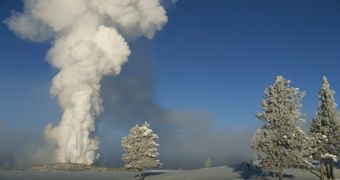A new study conducted between 1998 and 2006 indicates that the eruption patterns of geysers in the Yellowstone National Park, US are slowing down and could even stop as a result of global warming. Temperature readings performed on five of the geysers in the famous national park show that two of the best known of them, Old Faithful and Daisy Geyser, have decreased their eruption intervals from one hour and fifteen minutes to one hour and thirty one minutes and from one hour and forty minutes to two hours and fifty minutes respectively.
"Geysers are different from Steam vents, mud pots, and hot springs - they have eruptions. We wanted to know if we could learn something about Yellowstone's hydrothermal system by analyzing the intervals between these eruptions," said Shaul Hurwitz of the U.S. Geological Survey in Menlo Park, lead author of the study.
Although there is still much to learn about geysers and how they are influenced by climate changes, the eruption trends indicate at least some links between the two. Old Faithful for example, as its name suggests, is famous for its eruption regularity, although changes in variables such as water supplies, heat, rock fractures or even small scale could easily alter the eruption patterns and size.
Also, the study found that low levels of precipitation in the states of Wyoming, Montana and Idaho easily affect the activity of geysers in the Yellowstone National Park, having significant impact especially during long dry spells. "As the region went into a drier climate, all intervals got longer," Hurwitz said.
Even more curious is the fact that the geysers in Yellowstone respond differently to precipitations in the immediate vicinity of the park, although they all seemed to decrease their eruption patterns in the last decade or so. This basically implies that as less and less precipitations fall as a result of global warming, the geysers will erupt at ever increasing intervals of time, until they will eventually stop altogether.
"This study shows that changing the ability of water to recharge the geyser affects eruptions. Perhaps this too is how distant earthquakes affect eruptions - by changing the ability of surrounding water to recharge the geyser," said Michael Manga of the University of California.
"While the effects of short-term climate fluctuations do not appear to be too significant, longer-term climate change looks like it can have a big effect on geysers," he said. "This could be bad news for tourism," added geophysicist Ken Verosub also from the University of California. Neither Manga nor Verosub participated in the study.

 14 DAY TRIAL //
14 DAY TRIAL //